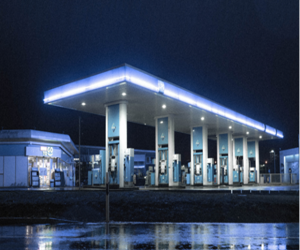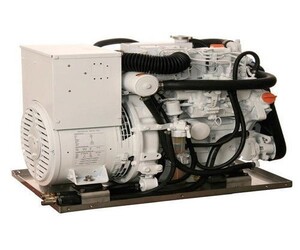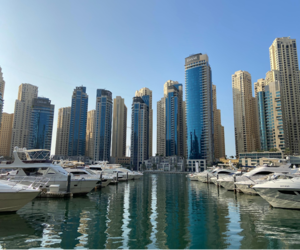Things You Should Know Before You Buy a Marine Generator in the UAE
A significant proportion of luxury boats above 28 feet (8.53 meters) in length, as well as work vessels of all sizes, carry marine gensets to give electrical power to various boat systems and accessories. Although a marine generator in the UAE is not an essential need, it is useful in situations when the main engines are shut down or shore power is unavailable, such as when the vehicle is anchored at sea. This alternative energy source conserves battery power and consumes far less gasoline than the primary engines.

As with other
portable generators, the standard marine generator in the UAE also operates on diesel or gasoline. A diesel-powered vessel will typically carry a diesel generator, whereas a gasoline-powered vessel would carry a gasoline generator. Typically, the generator aboard a boat will be connected to the vessel's fuel line, eliminating the need for a separate, space-consuming fuel tank. The introduction of efficient and clean-burning hydrogen-powered boat generators is generating considerable buzz in the maritime industry today. Currently, the only downside of a hydrogen-powered marine generator in the UAE is the need to locate a hydrogen fueling station.
Marine generators in the UAE come in many different sizes, and they are usually rated by how many kilowatts of electricity they can produce. One kilowatt is equal to one thousand watts. Smaller recreational vessels need a generator with a maximum capacity of three kilowatts, but larger luxury or working boats, such as luxury yachts, fishing vessels, ferryboats, and harbor tour boats, often have generators with a capacity of 25 kilowatts or more. The owner of a boat seriously considering the purchase of an electric generator would be well-advised to calculate the total wattage consumption of all appliances, instruments, and systems that will be powered by the generator, then consult an expert to ensure the correct marine generator is selected for the boat.
Marine generator in the UAE varies from residential or industrial generators. It is built and engineered to resist the moisture and corrosion issues associated with maritime environments. In addition, the great majority of naval generators do not need a self-contained cooling system, since saltwater is continually circulated through the generator core by hydraulic pumps. So, a marine generator will take up less room in the usually crowded engine rooms of a typical work or recreational boat.
Avoid conflating an inverter with a marine generator, since each needs a distinct electrical power source. An inverter will transform the direct-current (DC) battery power of a vessel into a weak alternating-current (AC) supply. In contrast, a generator offers consistent AC power independent of the batteries. This may be a significant factor when trying to start a yacht with depleted batteries and an inverter.

A marine generator in the UAE isn't much different from any other generator in terms of how it works and what it can do. Typically, a marine generator is driven by diesel or gasoline to create energy that is then transformed into electrical energy. This energy may subsequently be used to power a boat's appliances and equipment. A marine generator is present on the majority of bigger vessels, from fishing boats to yachts.
It is essential to remember, however, that there is a significant difference between a standard generator and a marine generator. A normal generator should never be utilized on board a ship for this reason. Many generators are far less effective in a damp setting, and it might even render them inoperable. When water splashes into the boat, a typical generator would cease to function.
In contrast, marine gensets are intended to withstand the rough and wet conditions of a boat. This means that the outside design needs to be different, and the inside needs to have different parts. Many marine generators in the UAE may be equipped with hydraulic pump systems, more robust materials, H-Class insulation, and other characteristics that increase their efficiency for usage on boats.
Why Is a Marine Generator Required?
You may be asking why a marine generator is necessary. In any case, your boat has a battery and you could always use an inverter to generate Alternating Current from the battery. This is fine so long as the power consumption does not exceed 3,500 Watts.
However, this is not always the case, since a single toaster often uses more than fifty percent of the maximum. If you are using high-energy consumption appliances, such as an air conditioner, refrigerator, or any combination of smaller appliances, you will need more energy than your battery can provide.
A marine generator is ideal for the task at hand. If you choose a decent-sized generator, it will be able to power all of your equipment without placing an extra load on the boat's batteries. Marine gensets are an absolute need for any vessel.
Safety Issues
When selecting a marine generator in the UAE, you must always consider the safety concerns, just as you would with any other sort of generator. These safety measures may be for your benefit or the environment, but they are always beneficial. It is well known, for instance, that all generators emit some pollution as a byproduct. Already, this is bad for the environment, but it keeps getting worse. If your boat is sitting still, this pollution from carbon monoxide can actually build up inside the boat. If allowed to accumulate in a cabin or other confined space, the gas is very toxic and may cause severe health problems.
Because of this, you should think about emissions when you are looking for a generator. Some generators are equipped with sensors that shut off the generator when carbon monoxide levels reach unsafe levels. Additionally, you might consider putting similar sensors throughout the boat to assure constant safety.
Importance of Appropriate Voltage Regulation
When selecting a new marine generator in the UAE, voltage regulation should be given careful consideration. These values always correspond to the 50Hz or 60Hz frequency of the AC current.
A 50Hz electrical appliance also operates with a 220 V regulator, however, the values for appliances are 120/240 V. 120 Volts is used for common appliances, whereas 240 Volts is utilized for motors such as air conditioners, dryers, and equipment.
The generator's voltage must be mentioned clearly.
The generator's frequency is governed by its motor speed. The optimal options are 1,500 or 1,800 RPM. The first frequency is 50Hz, whereas the second is 60Hz. There are faster and slower options, but none work as well as these standards.
Choose a marine generator that is smart, safe, effective, and dependable with this information. You don't want to invest in a generator that will fail next month, so take the time to research the top local and online brands and manufacturers.
Benefits of Having a Marine Generator

There are several benefits to having a boat generator here are some:
- • On your boat, you can enjoy the comforts of home. If you're going to be out on the water for days, boat generators can help you relax. You can watch movies, make your favorite dishes on the electric stove, reheat your packed meals in the microwave, and enjoy cool beverages from the mini-fridge.
- • Can serve as backup power if boat batteries fail. As a backup power source for your yacht, an emergency generator can be of great assistance in preventing uncertain occurrences such as being stuck at sea.
- • a cheaper cost of maintenance than gas generators
- • less expensive per Kilowatt than gas generators
• better noise suppression
- • reliable
- • safer operation because there is no sparking
- • longer life spans because of lower burn temperatures
Before looking for marine generator brands, you must assess your ship's requirements. This will assist you in narrowing down the available power and kinds of generators for your sailboat.
Types of Marine Generators
There are two main kinds of marine generators available: diesel-powered and gas-powered generators. The following describes their distinctions:
Gas Generators
Pros
- • Cost-effective
- • Readily accessible
- • Environmentally responsible
- • Silent operation
Cons
- • Disturbances in the supply
- • Emits carbon dioxide
- • Explosive fuel
Diesel Generators
Pros
- • Fuel efficiency
- • Long lifespan
- • Fewer maintenance requirements
- • Reliable power source
- • Convenient installation
Cons
- • More costly
- • Quite noisy
- • Expensive maintenance
- • Environmental issues
- • Limited fuel
- • Volatile fuel prices
What size generator will my boat need?
Marine Generators for Small Sized Boats (under 20′ in length)
Small generators (5-8 kW) from small boats can power a little refrigerator for beverages, portable fuel (less than 50 pounds) for cooking, sound systems, and other small equipment. These compact unit generators can also be used for safety and emergency needs, such as charging your boat's battery.
Marine Generators for Medium-Sized Boats (30 to 39 feet in length).
Medium boat generators (10-25 kW) can often generate the same amount of electricity as a small house.
Appliances such as refrigerators, electric ranges,
air conditioning, and television can work simultaneously and properly.
Marine Generators for Large Boats (39 feet and longer).
Most big boats (30 kW and more) feature galleys with culinary equipment such as ovens, microwaves, electric stoves,
chillers, and of course a refrigerator.
If your boat has a big generator, you’ll feel like you're at home because you can use many of your
home appliances.
How Simple is the Installation of a Marine Generator?
When installing a marine generator on your boat, you have two options: hiring a boat technician or doing it yourself.
If you have sufficient knowledge about boat generators and a thorough understanding of how they operate, installing one is simple. You can also browse the internet for online lessons, but be careful to follow each step with safety measures.
Conclusion
While it’s possible to go boating without a generator, having one may make weekend outings more comfortable. Just make sure that you get something that is the proper size and kind for your boat before you purchase it.


